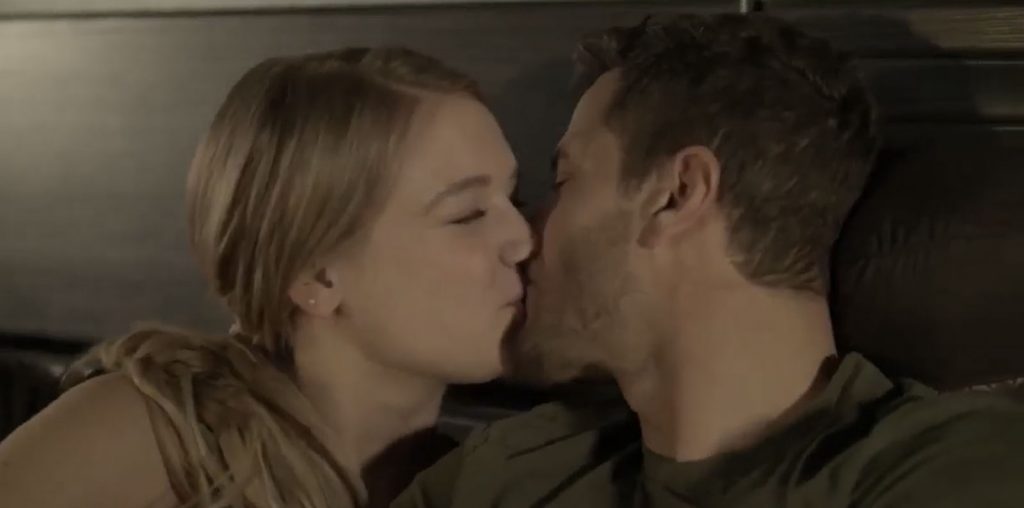
Poor Babe Ruth. He was desperately and passionately hopeful that his life story would be made into a Grade-A classic like “Pride of the Yankees,” and in return he was rewarded with “The Babe Ruth Story,” starring the incredibly un-athletic and clown-like William Bendix, in perhaps the closest thing to an Ed Wood sports movie ever made by a major studio. Even 1992’s “The Babe” stuck him with the gargantuan and tremendously overweight John Goodman, who barely looked capable of running to first base without suffering from severe heart failure. Ruth was a big man, but he was never that big. See for yourself. The Babe appears larger than life portraying his legend as joyfully as only he could in this pæan to teammate Lou Gehrig. If I have any criticism of “Pride of the Yankees,” it’s in the way it builds up Gehrig as the soft spoken intelligent alternative to the loud, raucous, and hard living Ruth.
One of the great legends of Babe Ruth was how he visited a bed ridden young man and promised to hit a home run for him in that day’s game. The Babe of course delivered on that promise. That scene is in “Pride of the Yankees,” but according to the film, after Ruth and the photographers left the hospital room, the shy and saintly Gehrig promised the boy two home runs if he would just promise to get better. I’m pretty sure this last bit of embellishment is pure fantasy. Besides, Lou Gehrig was impressive enough to stand on his own.
“The Pride of the Yankees” isn’t really a dyed-in-the-wool baseball movie, but it is a wonderful romance and heartfelt weeper. Then again, how could it fail? It’s a great and true story, penned by the guy who wrote “Citizen Kane,” starring Gary Cooper. Odds are Herman J. Mankiewicz and Gary Cooper could have even turned my life into something worth poring over.
Henry Louis Gehrig was born the son of immigrant German parents, which made him an unlikely hero for a movie made during and dedicated to the men off fighting World War II. A little bit of a mama’s boy, the young Gehrig promises to follow in the footsteps of his Uncle Otto and become an engineer, despite his prodigious baseball and football talents. When mom falls ill, Lou tells his layabout Dad to pretend he has a job and heads off for the minor leagues. The film has great fun with the elder Gehrig’s complete lack of knowledge or respect for the baseball world. In the early days of the game, players weren’t the high priced heroes of today. According to mom, “Baseballers are good for nothing. Loafers in short pants!”
Gehrig is soon called up to the Yankees but can’t seem to make his way off the pines until Wally Pipp sits out a game with the most famous headache in the history of modern civilization. Gehrig would proceed to play in over 2,000 consecutive games, and Pipp would never really be heard of again. For the record, all of the baseball scenes in the movie were shot in reverse so the right handed Cooper could plausibly resemble the left handed Gehrig.
When rookie Lou finally enters his first game, he trips over a row of baseball bats and is branded “Tanglefoot” by the adorable socialite Eleanor Twitchell, played by the beautiful and spunky Teresa Wright…while this is most likely yet another tall tale, all reports seem to agree that Lou and Eleanor had one of the most loving and supportive relationships in the history of the American League. The confident and pretty Eleanor is completely taken with the shy and forthright Gehrig (who could resist a guy who wears a tuxedo to a carnival?) and their growing love affair is one of the gentlest and most romantic in the history of film. Excellent use is made of the song “Always” by Irving Berlin, and there is a delightful middle of the night proposal involving Lou, Eleanor, a boarding house matron, and a beat cop.
Sadly, they don’t name diseases after heroes with happy endings, but Cooper shows Gehrig coping with his ailment in the manliest of fashions, fruitlessly trying to keep the true nature of his illness from his loving wife, and in the end delivering the most wonderful speech that ever echoed across a ball yard. Rent it with “Brian’s Song” and have yourself a great cathartic cry. Now if only the same could be done for the delightful and deserving Ruth.
